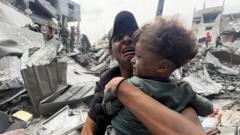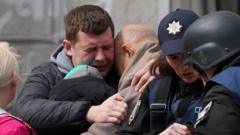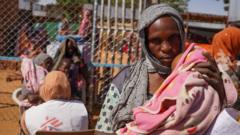A recent Israeli attack on a residential building in Gaza’s Shejaiya neighborhood leaves 29 Palestinians dead, escalating tensions amidst ongoing airstrikes and humanitarian concerns, while both sides exchange accusations regarding civilian safety and violations of international law.
Tragic Air Strike in Gaza Claims 29 Lives Amid Ongoing Conflict

Tragic Air Strike in Gaza Claims 29 Lives Amid Ongoing Conflict
An Israeli airstrike dramatically alters the landscape of Gaza as casualties rise and humanitarian crises deepen.
At least 29 Palestinians, including eight children, were killed in an Israeli airstrike on a multi-storey residential building located in Gaza City's Shejaiya neighborhood, as reported by a local medical facility. The strike occurred on Tuesday morning, with the Hamas-operated Civil Defence agency stating that Israeli warplanes targeted the vicinity of al-Hawashi mosque. Additionally, over 60 individuals sustained injuries, and rescue operations continue in search of several others believed to be trapped under the debris.
The Israeli military justified the strike by stating it aimed at a “senior Hamas terrorist” who allegedly orchestrated attacks in the region. The military emphasized measures taken to minimize civilian casualties, asserting the use of "precision weapons," but also accused Hamas of endangering civilians by employing them as human shields.
Eyewitness accounts from the shaken residents portrayed a scene of chaos and devastation, with one man describing the neighborhood as densely populated with displaced families and stating that multiple missiles were fired at the structure. "The dust and destruction engulfed us; all we could hear were screams of panic," he lamented.
Hamas referred to the airstrike as a "bloody massacre," while the casualties over the past few days have been significant, raising concerns over the humanitarian situation in Gaza. The Hamas-run health ministry reported at least 33 fatalities from Israeli strikes within the prior 24 hours, bringing the total of those killed since the resumption of hostilities on March 18 to an alarming 1,482.
Displacement figures continue to grow, with around 390,000 individuals forced to flee their homes in recent weeks, as the UN indicates that two-thirds of Gaza has been designated by Israel as “no-go” zones or under evacuation orders. The United Nations also noted a dire humanitarian situation, with essential supplies, including food, medicine, and fuel, running low due to a blockade that has lasted over a month.
UN Secretary-General António Guterres condemned the blockade, stating it violated international law, while also emphasizing that Gaza has descended into a “killing field.” The Israeli foreign ministry dismissed Guterres' remarks, insisting that claims of inadequate humanitarian aid in Gaza do not reflect the reality, asserting that over 25,000 aid trucks had entered the territory within the last 42 days.
The heads of six UN humanitarian agencies recently argued that Israel's assessment of food availability for Gaza’s population of 2.1 million was far from reality and reiterated the urgent need for civil protection, humanitarian assistance, and negotiation for hostages held by Hamas.
Efforts are underway to revive a ceasefire that was initially brokered in January, which saw Hamas release hostages in exchange for the release of Palestinian prisoners and a surge in humanitarian aid. The resumption of Israel's military campaign followed Hamas's refusal to engage with a ceasefire extension proposal and the potential release of some hostages remaining in their custody. The ongoing conflict has led to an unprecedented loss of life and heightened tensions in the region since October 7, 2023.


















